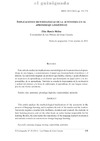Identificador persistente para citar o vincular este elemento:
https://accedacris.ulpgc.es/jspui/handle/10553/10227
| Campo DC | Valor | idioma |
|---|---|---|
| dc.contributor.author | Ramón Molina, Elisa | - |
| dc.date.accessioned | 2013-06-13T05:00:16Z | - |
| dc.date.accessioned | 2018-04-25T13:48:30Z | - |
| dc.date.available | 2013-06-13T05:00:16Z | - |
| dc.date.available | 2018-04-25T13:48:30Z | - |
| dc.date.issued | 2011 | - |
| dc.identifier.issn | 0213-0610 | - |
| dc.identifier.other | WoS | - |
| dc.identifier.uri | https://accedacris.ulpgc.es/handle/10553/10227 | - |
| dc.description.abstract | Este artículo analiza las implicaciones metodológicas de la autonomía en el aprendizaje de una lengua, y concretamente el papel que desempeñarán el profesor y el alumno. La autonomía requiere un profesor que facilite, oriente, y ayude al alumno en su proceso de aprendizaje, y un alumno que desempeñe un papel activo y se responsabilice de su aprendizaje. También se estudia la importancia de la motivación y actitud del alumno a la hora de enfrentarse al aprendizaje de una lengua extranjera de una forma autónoma. | - |
| dc.description.abstract | This article analizes the methodological implications of the autonomy in the process of language learning, and it explains the role of the teacher and the student. Autonomy requires a teacher who facilitates, monitors and counsels the students in their learning process, and on the other hand, an active learner responsible for his learning. Besides, the text studies the importance of the language learner’s motivation and attitude towards an autonomous foreign language learning. | - |
| dc.format | application/pdf | - |
| dc.language | spa | - |
| dc.relation.ispartof | El Guiniguada | - |
| dc.source | El Guiniguada. Las Palmas de Gran Canaria: Servicio de Publicaciones, Universidad de Las Palmas de Gran Canaria, 1984 [ISSN 0213-0610], n. 20, 2011, p. 151-176 | - |
| dc.subject | 58 Pedagogía | - |
| dc.subject.other | Autonomía | - |
| dc.subject.other | Aprendizaje lingüístico | - |
| dc.subject.other | Responsabilidad | - |
| dc.subject.other | Motivación | - |
| dc.subject.other | Autonomy | - |
| dc.subject.other | Language Learning | - |
| dc.subject.other | Responsibility | - |
| dc.subject.other | Motivation | - |
| dc.title | Implicaciones metodológicas de la autonomía en el aprendizaje lingüístico | - |
| dc.title.alternative | Methodological Implications Of Autonomy In Linguistic Learning | - |
| dc.type | info:eu-repo/semantics/article | - |
| dc.type | Article | - |
| dc.identifier.isi | 000215083600009 | - |
| dc.compliance.driver | 1 | - |
| dc.identifier.absysnet | 235347 | - |
| dc.identifier.crisid | 1496 | - |
| dc.identifier.eissn | 2386-3374 | - |
| dc.description.lastpage | 175 | - |
| dc.description.firstpage | 151 | - |
| dc.relation.volume | 20 | - |
| dc.investigacion | Artes y Humanidades | - |
| dc.rights.accessrights | info:eu-repo/semantics/openAccess | - |
| dc.type2 | Artículo | - |
| dc.contributor.daisngid | 7902169 | - |
| dc.identifier.external | 1496 | - |
| dc.description.numberofpages | 25 | - |
| dc.contributor.wosstandard | WOS:Molina, ER | - |
| dc.date.coverdate | 2011 | - |
| dc.identifier.ulpgc | Sí | es |
| dc.description.sellofecyt | Sello FECYT | |
| dc.description.esci | ESCI | |
| dc.description.erihplus | ERIH PLUS | |
| item.fulltext | Con texto completo | - |
| item.grantfulltext | open | - |
| crisitem.author.dept | Departamento de Didácticas Específicas | - |
| crisitem.author.fullName | Ramón Molina, Elisa María | - |
| Colección: | Guiniguada. 2ª Etapa. n.20, 2011 Artículos | |
Citas de WEB OF SCIENCETM
Citations
2
actualizado el 25-feb-2024
Visitas
312
actualizado el 15-ene-2026
Descargas
740
actualizado el 15-ene-2026
Google ScholarTM
Verifica
Comparte
Exporta metadatos
Los elementos en ULPGC accedaCRIS están protegidos por derechos de autor con todos los derechos reservados, a menos que se indique lo contrario.
